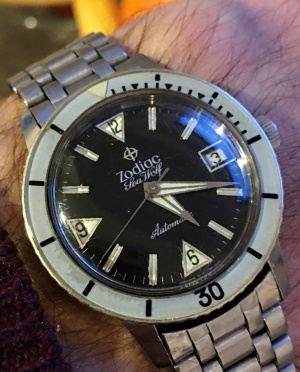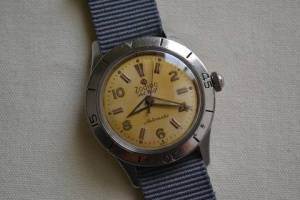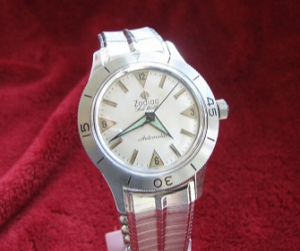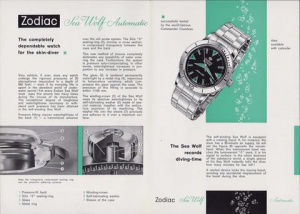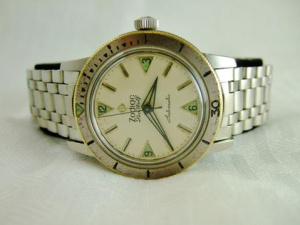Difference between revisions of "Zodiac SeaWolf"
| Line 36: | Line 36: | ||
At some point in 1961 the calibre 70-72 17 jewel movement was introduced and the inside back case was engraved 702-916. The signed 17 jewel Zodiac calibre 70-72 automatic movement was introduced in 1961, and has an AS1687/1688 calibre base, and runs at 21600 bph with a running reserve of 40 hours. The movement is hackset, and the calendar function is quickset requiring the crown to be depressed fully. This very successful AS calibre, later with 21 jewels was produced under the Communautee Horlogere de Precision, and was also used by [[Doxa]], [[Girard Perregaux]], [[Favre Leuba|Favre-Leuba]], and [[Eberhard]] & Cie. | At some point in 1961 the calibre 70-72 17 jewel movement was introduced and the inside back case was engraved 702-916. The signed 17 jewel Zodiac calibre 70-72 automatic movement was introduced in 1961, and has an AS1687/1688 calibre base, and runs at 21600 bph with a running reserve of 40 hours. The movement is hackset, and the calendar function is quickset requiring the crown to be depressed fully. This very successful AS calibre, later with 21 jewels was produced under the Communautee Horlogere de Precision, and was also used by [[Doxa]], [[Girard Perregaux]], [[Favre Leuba|Favre-Leuba]], and [[Eberhard]] & Cie. | ||
| − | ===Version 2b== | + | ===Version 2b=== |
[[File:702916.jpg|thumb]] | [[File:702916.jpg|thumb]] | ||
The first model of the 702-916 had no date and had dauphine hands with broad lumes. The lume material was prone to falling out, and the hands were changed to have a central spine in future models. History will show this was not a complete success as many models now have lost their lume over the years. | The first model of the 702-916 had no date and had dauphine hands with broad lumes. The lume material was prone to falling out, and the hands were changed to have a central spine in future models. History will show this was not a complete success as many models now have lost their lume over the years. | ||
Revision as of 22:51, 22 April 2020
Zodiac SeaWolf
The first diver’s watch with a rotating bezel
The Zodiac Sea Wolf was announced at the Basel Fair together with the Fifty Fathoms from Blancpain in 1953. Both are credited with being the first commercially available diver’s watch. However, the Zodiac was rated at 10 atmospheres (339 feet) and was more highly rated than the Blancpain 50 fathoms (300 feet).
Ref:699
Version 1a - 1953 SeaWolf with CountDown Bezel
Movt:AS1624 and others Casenumber: 699
The 1953 issues had an external bidirectional steel bezel. This is signed 10 Atm (339 feet) below the Zodiac logo, and name Zodiac, but has a plain screw-down case back. The dial has numerals at 2, 4, 6, 8 and 10 with fluted indices elsewhere. The numerals have been inked over. The bezel is elapsed time basis, with numerals at 45, 30 and 15. The hands are broad lumed Dauphine shape with no centre line. The serial numbers of metal bezel models generally run from 122xxxx to 192xxxx The case back is engraved “ZODIAC SEAWOLF WATER – TESTED 10 ATM ESPECIALLY” along with the Zodiac emblem. Zodiac used A. Schild movements and the 17 jewel AS1624 was used by Zodiac and Ernest Borel.
Version 1b - 1950s SeaWolf with Numbered Triangles
A later model 699 had the count down bezel but the dial now had triangular indices at 3, 6, 9 and 12 o’clock with applied numerals inserted into the lume.
The early Zodiac movement (AS1624 without hacking) predated the calibre 70-72 movement. The AS calibre 1624 was developed in the early 1950s, and runs at 18,000 bph with a running reserve of 42 hours. Zodiac, in conjunction with Doxa, Eberhard, Favre-Leuba, and Girard-Perregaux, later refined AS base calibres to produce the Zodiac calibre 70-72 used in subsequent model Zodiac Sea Wolf.
All early countdown bezel Sea Wolf watches are rare.
Version 1c 30 only Bezel
The uni-directional bezel from the mid to late 50’s is much more common with the numeral 30 only appearing. The bezel was still plated brass. The watch retained the previous dial, still with broad-lumed dauphine hands. The dial below still reads “SWISS” below 6 o’clock indicating radium usage. The 699 model designation continued but the caseback fitting changed from a screw back.
A press-fit caseback was fitted initially wkith a rating of 10 atmospheres, later becoming 20 atmospheres. The 10 ATM case back was engraved on the flat, while the 20 ATM casebook was engraved on the slope.
Ref 702
Version 2a - 1961
Movt: 70-72 Casenumber: 702-916 non-date and 722-916 for date.
At some point in 1961 the calibre 70-72 17 jewel movement was introduced and the inside back case was engraved 702-916. The signed 17 jewel Zodiac calibre 70-72 automatic movement was introduced in 1961, and has an AS1687/1688 calibre base, and runs at 21600 bph with a running reserve of 40 hours. The movement is hackset, and the calendar function is quickset requiring the crown to be depressed fully. This very successful AS calibre, later with 21 jewels was produced under the Communautee Horlogere de Precision, and was also used by Doxa, Girard Perregaux, Favre-Leuba, and Eberhard & Cie.
Version 2b
The first model of the 702-916 had no date and had dauphine hands with broad lumes. The lume material was prone to falling out, and the hands were changed to have a central spine in future models. History will show this was not a complete success as many models now have lost their lume over the years.
